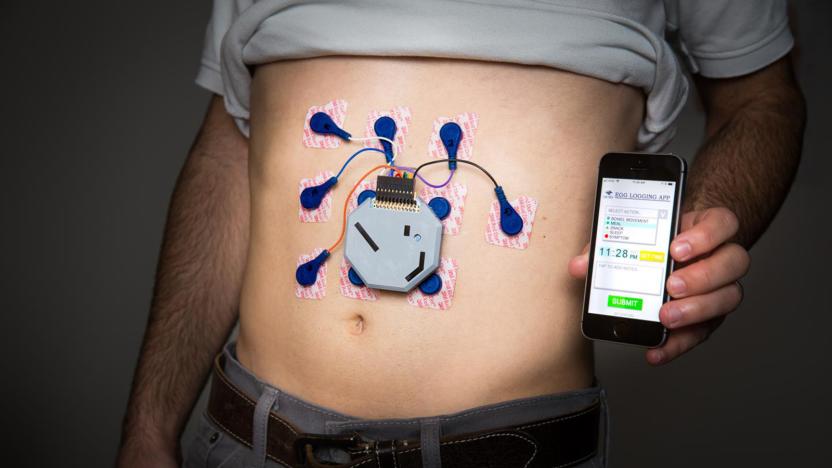gastroenterology
Latest

Stomach wearable could replace the need for invasive probes
Researchers have created a wearable monitor that can track your stomach's electrical activity for signs of digestion maladies. Called electrogastrography (EGG), it's like an EEG for the GI tract, and was used briefly in the '90s but abandoned due to a lack of usefulness as a diagnostic tool. UC San Diego scientists are trying to resuscitate it with improved hardware and, most importantly, algorithms that help filter out noise. The results so far are promising, and if perfected, it could help doctors diagnose gastro-intestinal problems without the need for invasive probes or even a hospital visit.

This tiny digestive tracker can tell what food gives you gas
One of my favorite things to eat is cheese and egg on a bagel. But while it's delicious, let's just say that afterward we don't get along so well. Is it the egg? The cheese? I could go to the doctor and find out which and why, but the testing process is long and expensive and still might not turn up an answer. So I just end up avoiding something I love. I'm not alone: Many people end up feeling sick after eating common foods without knowing why, and often restrict their diet out of fear. FoodMarble's AIRE digestive tracker, available for pre-order starting today, gives users the power to face those fears: It's a portable diagnostic device with an app that is easy to use, affordable and doesn't require you to give up entire days to doctor's visits.

Pulsing pill promises to put an end to problematic pooping
The average trade-show diet of meat and bread plays havoc with our bodies, so it's no surprise everything grinds to a standstill after a long week. Israeli company Vibrant looks ready to solve our intestinal woes with its chemical-free way to treat constipation. Rather than plying our bunged-up bodies with drugs, the outfit is ready to show off its pill, the size of a vitamin, that begins vibrating six-to-eight hours after being swallowed. Sitting on the wall of the large intestine, the vibration induces peristalsis -- the squeezing motion that pushes matter from one end of your body to the other -- without the use of laxatives. The earliest trials have been successful, with participants who took a pill twice a week finding their movements doubling without anyone experiencing adverse side effects. Well, except for the poor souls who now have to write about this without giggling, of course.

5 Apps for the Gastroenterologist
Sometime this summer a wiseacre commenter (we get a few) suggested we do a "Five Apps" for a variety of somewhat offbeat topics. One wasn't so far-fetched however: gastroenterologist. One could say that a gastro doc has about the same needs as any doctor, of course, and that's an easy out. So here are 5 apps that are great for gastroenterologists and possibly any medical specialist... Coming soon: 5 apps for the lemur owner. Epocrates Rx - This free app looks up drugs and is updated weekly. Epocrates [iTunes link] has already been available for other mobile platforms for a while, this is a must-have for physicians, I would think. There's also a Pro version that is designed for medical professionals, and it requires a yearly subscription fee to work. It's $99 for one year, which is pretty reasonable for what this does -- which includes an amazing pill ID tool. DocWrite - Another free app with a service you subscribe to, but this may appeal to more than doctors. DocWrite [iTunes link] is a transcription service that sends your ramblings securely and sends you back a complete transcription in PDF or Word. DocWrite has a web-based dashboard for your stuff, too, so you'll never be without those documents in text or audio. PubSearch - PubMed is a massive database of medical research papers and PubSearch (free version) [iTunes link] is an iPhone app that'll search them. Yes, of course you need a subscription to the database (noticing a trend here?). PubSearch also has a Mac desktop app, although there does not seem to be any coordination between the two. I'd imagine something like sharing bookmarks would be helpful. PubSearch Plus [iTunes link] costs $1.99 and is really the more functional version as it will show full articles and use EZProxy (where supported). Medcalc - A free medical calculator? Yep, Medcalc [iTunes link] includes a ton of formulas for doctors, plus a few indices and charts and whatnot to keep a handy reference for those who need it. This app seems to cover a lot of ground, although I'm not sure how much applies to the field of gastroenterology. Mobile MIM for iPhone and iPod touch - Sadly, this has yet to be released. But I'm guessing it'll be at the top of many doctors' wish lists. MIMvista makes real-deal medical imaging stuff and the MIM app for iPhone was demonstrated at WWDC. The demo was astounding, showing how doctors could merge CT and PET scans right on their iPhone and make notes for later use. The app is pending FDA approval, with no release date or price set.


